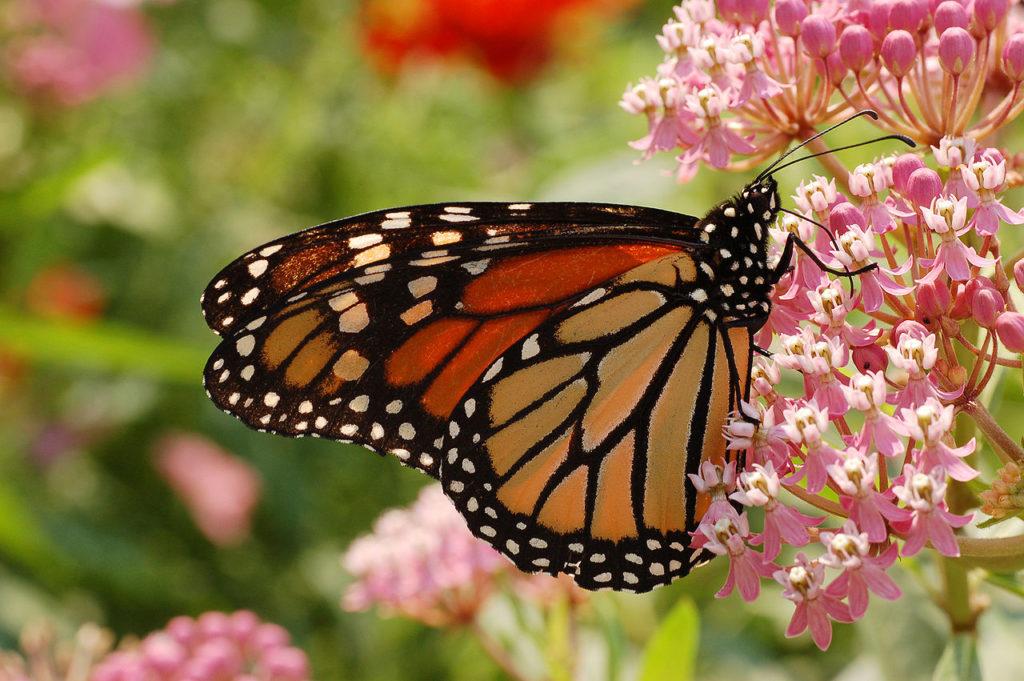In response to deeply concerning population decline for the eastern monarch butterfly, a consortium of over 30 groups and organizations introduced a statewide strategy to strengthen conservation efforts for the possibly endangered species. “The Iowa Monarch Conservation Strategy” acts as a strategic and policy platform aimed at gathering both the information and resources necessary to push monarch butterfly conservation forward. Members of the consortium span industries from business and agricultural sectors, to government commissions and local-grassroots organizers.
The consortium has arisen in response to the over 80 percent decline in eastern monarch populations over the last two decades and the surrounding petition and conservation efforts put forward by various research centers and groups across the country. In a petition filed in 2014 calling for monarchs to be registered under the Endangered Species Act (ECA) filed by the Center for Biological Diversity and the Center for Food safety, petitioners likened the scale of the monarch’s decline a hypothetical slashing of the U.S. population, stating the loss is proportional to the loss of every living person in the United States except those in Florida and Ohio.
According to the Strategy, much of the loss can be attributed to the decimation of common milkweed habitats across Midwestern cropland due to the prevalence of herbicide glyphosate that is used in many large-scale corn and soybean farms (brand name Roundup). Milkweed is integral to monarch life as it their host plant for laying eggs and the food source that allows for caterpillars to mature into butterflies. It is also the main source of food for migratory monarchs across the U.S. In a recent interview with Elizabeth Hill, Outreach Coordinator for the Center for Prairie Studies and Manager of the Conard Environmental Research Area (CERA), she summed it up best in saying, “If we love monarchs we need to love milkweed.”
Iowa is pivotal for monarch migration as it is the site of their summer breeding range, hosting over 40 percent of the total population of monarchs that winter in Mexico. The large agricultural industries that have defined Iowa economically have decimated milkweed habitats and growth across the state due to the implementation of the aforementioned Roundup herbicide.
Recognizing the central role that Iowa plays in monarch conservation and population recovery, the Strategy outlined five imperatives that Iowans, both individuals and organizations, can follow immediately: take advantage of the Farm Bill programs to establish monarch breeding habitats, volunteer to establish habitats on local farms, more closely follow pesticide labels and state regulations when apply pesticides as to avoid unnecessary exposure to monarchs, use monarch-friendly weed management for roadsides and other rights-of-way and establish monarch waystations, gardens with both nectar plants and milkweeds, where monarchs can stop while summering to find food and reproduce.
Even before these measures were recommended, community members as well as local area farmers and organizers have already been putting these measures into action. CERA, as an experimental and conservation site, has hosted student research, most recently conducted by Amanda Bressoud ‘17 and Jane Jordan ‘18 this past summer, which has led to the planting of over 1,000 milkweed plants across four species in order to test egg laying rates and caterpillar health.
There have been monarch waystations established all around Poweshiek county, from right outside of Drake Community Library and Grinnell Regional Medical Center to across Grinnell’s campus, as found in Macy House’s prairie field. According to Hill, our own local Grinnell Heritage Farm has refused to use pesticides harmful to pollinator health and makes a variety of land management decisions as to aid pollinator health on the farm.
A particularly Grinnellian initiative to help monarchs was implemented by Kelly Guilbeau of the Center for Careers, Life, and Services that is focused on milkweed planting across Iowa’s roads and right of ways. The initiative called “Milkweed Matters” seeks to increase pollinator habitats by distributing seedballs into roadsides during large-scale bike rides. Iowa, being home of the Register’s Annual Great Bicycle Ride Across Iowa (RAGBRAI) is the perfect testing ground.
“We have focused on RAGBRAI so far, which attracts over 15,000 riders from across the country to ride from the Missouri river to the Mississippi river, over 400 miles, during a week in late July,” Guilbeau said. “We hold educational seedball rolling events across the state during the spring of each year, engaging thousands of Iowans. Last year, we rolled over 52,000 seedballs.”
Milkweed Matters also has a riding team that competes in RAGBRAI every year to raise awareness and gather more people to the cause.
“I even wear sturdy Monarch wings as I ride so people recognize me“ said Guilbeau.
Outside of RAGBRAI, Milkweed Matters, partnering with CERA and the Center for Prairie Studies, will be hosting a variety of milkweed seedball-making workshops this spring, one on April 20 on campus, and another on May 6 at CERA
All of these intiatives, in typifying the efforts put forward by the Consortium’s strategy, highlight the collaborative and community-wide force that will lead to the change necessary to save the monarchs. As Hill succintly stated, “Yes we have a federal strategy and statewide strategy, but monarchs are only going to be saved by local people and local work in local populations. The best place to do any kind of work for monarchs is in your backyard.”



















































